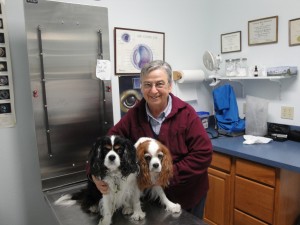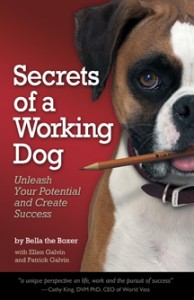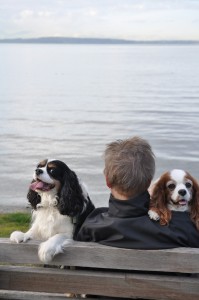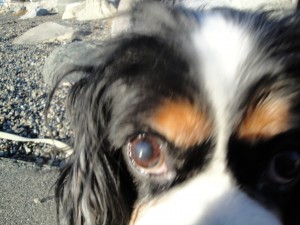
Hero Dog Alki
I’m clumsy. I survive by assuming everybody else is, too.
Despite the obvious (and frequently embarrassing) hazards, it’s a pretty good way to live. Really.
Don’t take me wrong. Injuries, hurt feelings, creepy people and events: not into them. But I am into building community, and for me that can sometimes mean being clumsy.
Lending a Hand
One afternoon I was on the beach access ramp with my dogs. Tree-sized driftwood blocked the ramp, so the woman walking towards us carrying a baby had a difficult climb.
What would a clumsy person do? I stopped and offered her my hand.
She politely refused, but as she climbed up on the log, it rolled and threw her off balance. As I reached for her, she clutched the baby tightly in one arm and held out the other, saying, “I’ll take that hand.”
In a few seconds both were safely on the ramp.
Lending a Leash
Several weeks later I was out alone with my younger dog, Alki, who has recently become deaf. Alki has understandably been emotional, cranky, and skittish about becoming deaf, especially with other dogs.
That day, a loose dog ran up to us, a dog I thought might live nearby. Now any dog can be dangerous, especially a strange one. Plus Alki was once mauled, and I was injured saving him while beating the crap out of the attacking dog (fierce mama, that’s me). So I hesitated.
What would a clumsy person do? I stopped to help the dog.
I called it to us, making sure it kept its distance but stayed with us (and out of the street). While I was calm and cheerful, I closely watched both dogs. As the loose dog warily regarded us, Alki visibly braced himself, gently greeted the dog, then quietly and calmly helped me herd it. When the dog stopped to sniff something, we waited. When it wandered away, Alki urged it back with a head shake that could only mean, “Follow us, buddy.”
Eventually we got down the block, and two neighbors out with their dog stopped to help. The wandering dog was soon reunited with its family.
The point? Oddly, being clumsy works.
We can worry that the world has too many problems, and nothing we can do will matter. Or we can assume that we’re all clumsy, together, and lend a hand—or a metaphorical leash—when we can.
It’s all part of building community. Is your way easier than being clumsy? Tell us about it.
(c) 2011 Robyn M Fritz
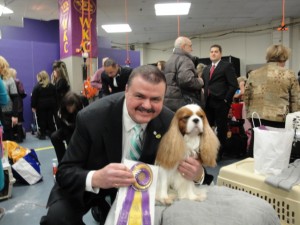 If you’re going to New York and have to leave your own dogs (and cat) at home, there’s one sure way to get your dog fix: arrange to be there in February, when New York goes doggy for the Westminster Kennel Club Dog Show at Madison Square Garden in Manhattan.
If you’re going to New York and have to leave your own dogs (and cat) at home, there’s one sure way to get your dog fix: arrange to be there in February, when New York goes doggy for the Westminster Kennel Club Dog Show at Madison Square Garden in Manhattan.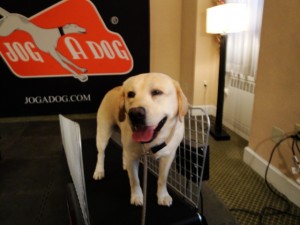 At the Affinia Hotel I followed the sign to the dog exercise room. That’s where the people from Jog a Dog had set up two of their dog treadmills. Established 40 years ago by an inventor who trained German Shepherds for rigorous police and protection work (called schutzhund), today it’s a thriving business catering to canine athletes, from conformation specialists (show dogs) to agility or tracking experts.
At the Affinia Hotel I followed the sign to the dog exercise room. That’s where the people from Jog a Dog had set up two of their dog treadmills. Established 40 years ago by an inventor who trained German Shepherds for rigorous police and protection work (called schutzhund), today it’s a thriving business catering to canine athletes, from conformation specialists (show dogs) to agility or tracking experts.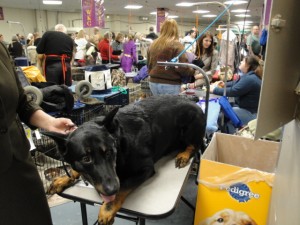 The show circuit for these two was an afterthought. Marlene purchased Gideon when he was 11 weeks old, to train as a search and rescue dog. Together they work for Klamath Search and Rescue in Klamath Falls, Oregon. When people suggested his conformation might make him a show dog, Marlene decided to go for it, which is how Gideon became a champion and was at Westminster (he did not win this year).
The show circuit for these two was an afterthought. Marlene purchased Gideon when he was 11 weeks old, to train as a search and rescue dog. Together they work for Klamath Search and Rescue in Klamath Falls, Oregon. When people suggested his conformation might make him a show dog, Marlene decided to go for it, which is how Gideon became a champion and was at Westminster (he did not win this year).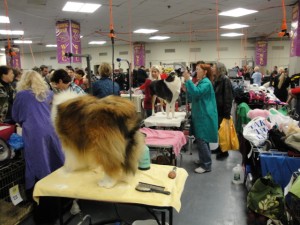 All morning long I snapped photos of dogs being primped for their big moment, their hair wrapped or snipped, while others snoozed or greeted visitors. Their humans educated people about their breed, whether they herded sheep or held down a lap in style. Their emphasis? While showing dogs is a sport they enjoy, the dogs are family first and foremost.
All morning long I snapped photos of dogs being primped for their big moment, their hair wrapped or snipped, while others snoozed or greeted visitors. Their humans educated people about their breed, whether they herded sheep or held down a lap in style. Their emphasis? While showing dogs is a sport they enjoy, the dogs are family first and foremost.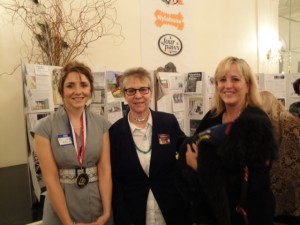 On the left is Julie Reck, DVM, a young vet who owns
On the left is Julie Reck, DVM, a young vet who owns 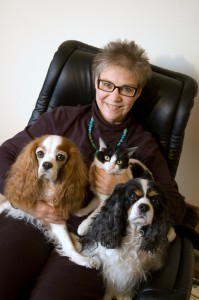
 Sometimes we wonder if we’ve done the right thing in life. Sometimes we get lucky and know we did, even though we were just trying to get by. Sometimes that story co-incidentally defines another, which is what building community is all about.
Sometimes we wonder if we’ve done the right thing in life. Sometimes we get lucky and know we did, even though we were just trying to get by. Sometimes that story co-incidentally defines another, which is what building community is all about.